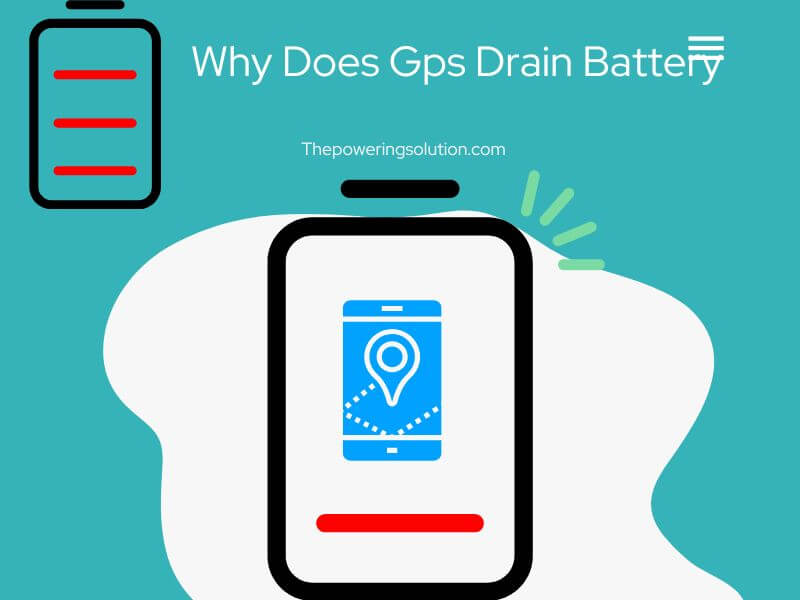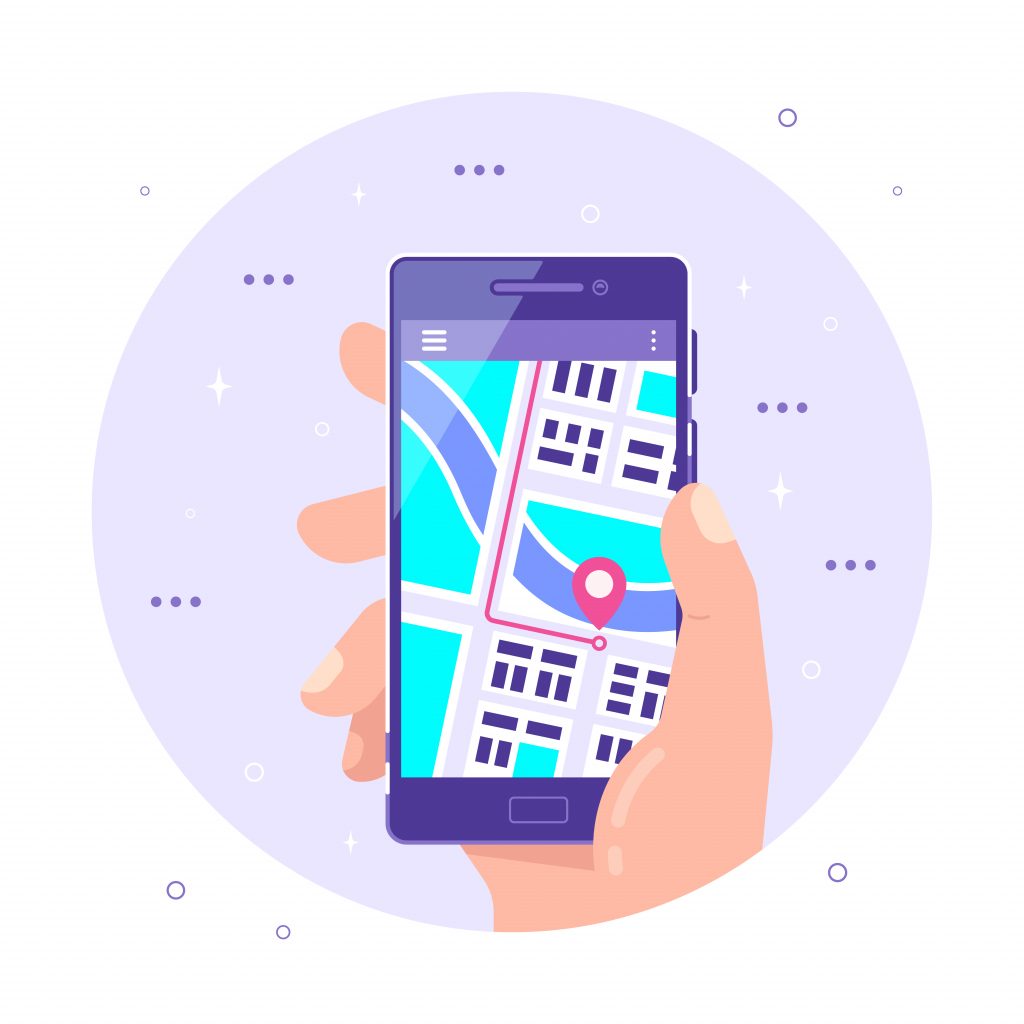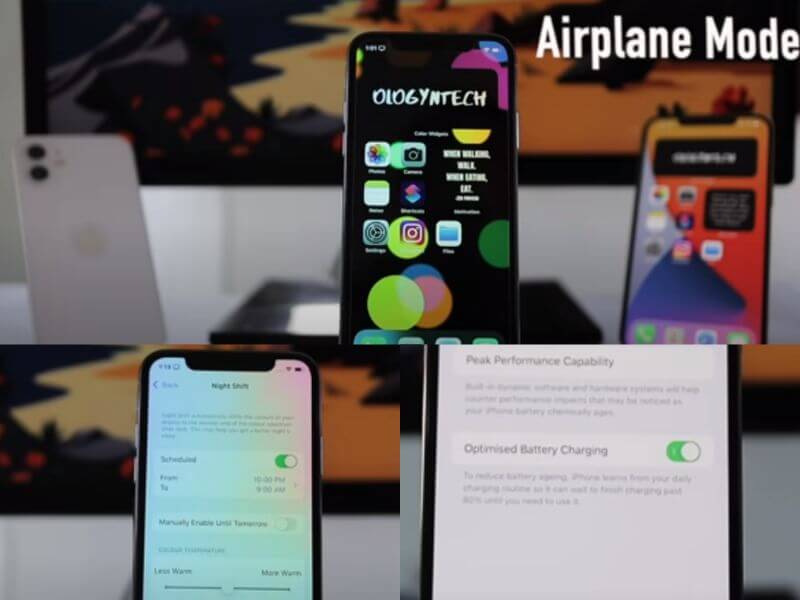There are a number of factors that can affect how quickly your GPS drains the battery. One is simply how often you use it. If you’re constantly checking your location, whether for directions or to see where you are on a map, your battery will drain more quickly than if you only occasionally consult your GPS.

The age and model of your device can play a role; newer devices with more sophisticated features tend to have better battery life than older ones.
The quality of your GPS signal can also impact how much power it uses. If you’re in an area with a weak signal, your device will have to work harder to triangulate its position, using up more battery in the process.
If you want to learn more about GPS and how to save more battery keep reading the article.
GPS Draining Battery Android
GPS is a staple feature on most smartphones these days. It’s great for getting around town, finding your way home, or even tracking your run. GPS can also be a real battery killer.
If you’re not careful, it can quickly drain your Android phone’s battery. There are a few things you can do to help conserve your battery life when using GPS on your Android phone.:
- Make sure you only use GPS when you need it. There’s no need to keep it turned on all the time. There’s no need to keep it turned on all the time.
- Try to use offline maps whenever possible. This will help reduce the amount of data that needs to be downloaded and can also help improve accuracy.
- Consider investing in a portable charger or power pack so you can keep your phone charged up while on the go.
With a little bit of planning and effort, you can minimize the impact of GPS on your Android phone’s battery life. By following these tips, you should be able to get the most out of your device without having to worry about running out of juice too soon.
Does GPS Drain iPhone Battery?
GPS is a great tool for navigation, but it can also be a real battery drain on your iPhone. Here are some tips to help you minimize the impact of GPS on your iPhone battery:
| Use Wi-Fi whenever possible. | If your iPhone has an active data connection, it will use GPS to determine your location. By using Wi-Fi instead, you can save battery power. |
| Use Location Services sparingly. | Location Services uses GPS to track where you are and report that information to apps that request it. If you don’t need this feature, disable it in the Settings app. |
| Keep an eye on the map. | The more detailed the map is, the more power it will consume. If you don’t need a detailed map, switch to a less detailed one or turn off the map entirely. |
| Limit background refreshing for apps that use Location Services. | Many apps will refresh their content in the background when they detect that your location has changed. This can lead to unnecessary battery usage. |
Does Location Services Drain Battery iPhone 13
If you’re like most people, you probably have your iPhone with you all the time. And if you use location services on your iPhone, it can definitely drain your battery life. Location services allow apps to use information from cellular, Wi-Fi, and Global Positioning System (GPS) networks to determine your approximate location.
This is incredibly useful for mapping and navigation apps, but it can also drain your battery life. If you’re concerned about how much battery life location services are used on your iPhone, you can do a few things to minimize the impact. Here are some tips:
Check the Apps
Check which apps are using location services. Go to Settings > Privacy > Location Services to see which apps have recently used your location data. If there are any that you don’t need to use location services all the time, consider disabling them or only allowing them to use your location when they’re open.
Choose the Most Level of Accuracy
Choose the most accurate level of accuracy for each app. Apps that don’t need pinpoint accuracy can use less power by choosing a less precise level of accuracy in their settings. For example, in the Maps app, you can choose between “Best” and “Good” when determining directions; “Good” will be less precise but will also use less power than “Best.”
Use Low-Power Mode
Use low-power mode when possible. Low-power mode conserves battery power by reducing or disabling certain features and functions while it’s turned on; one of those features is background refresh, which includes refreshing apps that use location services in the background.
So if you know you’ll be somewhere without access to power for a while (like on a long hike), enable low-power mode beforehand to help conserve battery life.
To turn on low-power mode, go to Settings > Battery > Low Power Mode.
Tracking App That Doesn’t Drain Battery
If you’re looking for a tracking app that doesn’t drain your battery, there are a few things to consider.
- Ensure the app is designed to track your location in real time. Many tracking apps only update your location every few minutes, which can significantly reduce battery life.
- Check to see if the app offers any battery-saving features, such as disabling GPS when not in use or adjusting the tracking interval.
- Look for user reviews of the app to get an idea of how well it performs in terms of battery life.
Does Turning on Location Drain Battery Reddit
There’s a lot of Reddit debate about whether turning on your location services drains your battery. Some people say it does, while others claim it doesn’t make a difference. So, what’s the verdict?
Well, it turns out that there is some truth to both sides of the argument. Location services use battery power, but how much depends on how often and accurately you use them. If you’re constantly checking in at different locations or using GPS for navigation, your battery will drain faster than if the location is turned off.
The impact on your battery life is minimal if you only turn on location when you need it (for example, when using a mapping app). So ultimately, it’s up to you whether or not you want to keep location services enabled on your device. If you’re worried about conserving battery power, disabling location is one way to help extend its life.
Pingo App Draining Battery
It’s no secret that our phones are constantly draining our battery life, even when we’re not using them. And one of the main culprits is apps that run in the background, even when we’re not using them. Pingo is one of those apps.

It’s a location-sharing app that runs in the background and drains your battery life, even when you’re not using it. If you have Pingo installed on your phone, you might consider uninstalling it or turning off its background location-tracking feature. Otherwise, you’ll find your battery life quickly dwindling away.
How Do I Stop My GPS from Draining My Battery?

You can do a few things to stop your GPS from draining your battery:
| Run only important apps in the background | Background processes can use up a lot of battery, so it’s important to limit them as much as possible. You can check which apps are running in the background by going to Settings > Battery > Background Activity. |
| Use airplane mode | This will disable all wireless connections and conserve battery power. You can turn on airplane mode by swiping down from the top of your screen and tapping the airplane icon or by going to Settings > Wireless & Networks > Airplane Mode. |
| Reduce brightness | A brighter screen uses more battery power than a dimmer one, so reducing the brightness can help conserve power. You can adjust your screen’s brightness by swiping down from the top of your screen and tapping the sun icon or by going to Settings > Display > Brightness level. |
| Use a live wallpaper | Use a live wallpaper instead of a static one. Live wallpapers animate on your home screen and use up more battery than static ones, so using a static wallpaper will help save power. To change your wallpaper, go to Settings > Wallpaper > Home ScreenWallpaper |
Why Does GPS Consumes More Battery?
GPS is a power-hungry technology. When your phone is constantly searching for satellite signals, it uses up a lot of battery power. Even if you’re not actively using GPS, it can still be running in the background and eating up your battery.
There are a few things you can do to help conserve battery life when using GPS:
| Use airplane mode | This will disable all wireless radios on your phone, including GPS |
| Use a lower-powered GPS mode | Many phones have different GPS modes that use less power but are still accurate enough for most purposes. |
| Keep moving | If you’re standing still, your phone will keep searching for satellite signals and using up battery power. If you’re moving, you will have an easier time finding and locking onto a signal. |
| Avoid using other apps while tracking with GPS | Running other apps simultaneously as GPS can tax your processor and reduce battery life even further. |
Does Keeping GPS on Drain Battery?
Yes, keeping your GPS on can drain your battery. Here’s how it works: when your GPS turns on, your phone is constantly searching for satellites and trying to establish a connection. This uses up a lot of power, which can quickly drain your battery.
If you’re using your GPS for navigation, it’s best to keep it plugged in to avoid this issue.
Does GPS Use a Lot of Battery iPhone?
GPS is a battery hog; there’s no denying it. But just how much of your iPhone’s battery does GPS use? And is there anything you can do to reduce that impact?
Let’s take a look. How Much Battery Does GPS Use on iPhone? GPS uses quite a bit of battery power on your iPhone, but exactly how much depends on a number of factors:
- For example, if you’re using turn-by-turn navigation in an app like Google Maps, that will have a greater impact on your battery life than simply checking your current location in another app.
- In general, you can expect GPS to use up around 1-2% of your iPhone’s battery per hour. So if you’re using GPS for an hour or two each day, it could be responsible for 10-20% of your daily battery drain.
Of course, that percentage will be higher if you’re using turn-by-turn directions or other features that keep the GPS antenna active for extended periods of time. And if you live in an area with poor satellite reception, your phone will have to work harder to maintain a connection, leading to increased battery usage. What Can You Do To Reduce The Impact Of GPS On Your Battery?
Thankfully, there are some things you can do to help reduce the impact of GPS on your iPhone’s battery life:
Use Wifi When Possible
If you’re going to be using turn-by-turn directions or another feature that requires constant access to GPS data, make sure to connect to WiFi first so that your phone doesn’t have to use its cellular data connection. This will help reduce the amount of time the GPS antenna is active and hopefully save some battery life in the process.
Check for Updates
Be sure that you have the latest software updates installed on your iPhone as these often include improvements specifically for managing power consumption related to features like GPS .
Take Brakes
If you’re going somewhere new and are relying heavily on turn-by-turn directions from apps like Google Maps, try to take breaks periodically so that your phone can rest and recharge. This won’t necessarily save power while actively using GPS, but it can help prolong overall battery life during extended trips.
Following these tips should help minimize the impact of GPS on your iPhone’s battery life.
Apple: When the GPS is Enabled, Does It Drain the Battery? (3 Solutions!!)
GPS devices are extremely convenient, but they can be a real pain regarding battery life. Why does GPS drain the battery? There are a few reasons why GPS devices tend to use up a lot of battery power.
Can Solar Panels Help Reduce the Drain on GPS Battery?
Solar panels have the potential to reduce the drain on GPS battery by providing a renewable energy source for charging. By using a solar panel potential map, users can identify optimal locations for installing solar panels to power GPS devices, thus reducing the need for battery replacements and extending their lifespan.
Conclusion
GPS devices are becoming increasingly commonplace, but they can be a real drain on your battery. Here’s a look at why GPS drains battery and what you can do about it. GPS uses a lot of power because it needs constantly communicates with satellites in order to determine your location.
This constant communication means that GPS is one of the most power-hungry features on your phone. You can do a few things to minimize the impact of GPS on your battery life.
Make sure you only use GPS when you need it. If you’re just using your phone for general navigation, there’s no need to keep GPS turned on all the time.
Try to avoid using other power-hungry features while using GPS. This includes things like streaming music or video or using the camera.
Ensure your phone is in good condition and its battery is properly calibrated. A well-maintained phone will have better battery life overall, which will help minimize the impact of GPS on your battery life.
You May Like These Resources:
